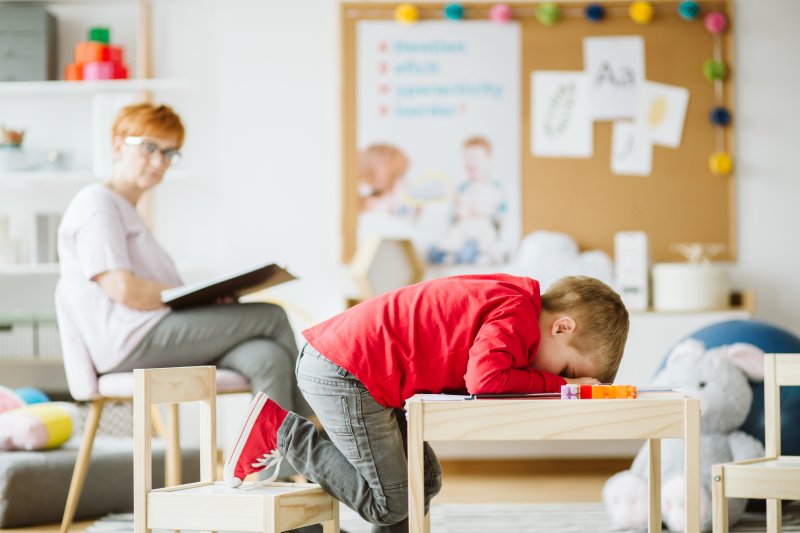
Attention deficit hyperactivity disorder (ADHD) is characterized by inattention, impulsiveness, and hyperactivity. When untreated, ADHD can negatively affect the sufferer’s life and the lives of loved ones. Despite the seemingly excess energy that ADHD sufferers have, it may be surprising that 25-50% of people with the condition also struggle with sleep problems.
How does this even work? Shouldn’t sleep issues cause someone to be tired and lethargic? As always, the science behind the brain isn’t so simple, but understanding this connection may be essential for countless people affected by ADHD.
ADHD & Sleep Disorders in Adults
The five sleep disorders found most often in people with ADHD, no matter their age, are insomnia, circadian rhythm sleep disorder, narcolepsy, restless leg syndrome, and sleep apnea. Additionally, ADHD-like symptoms are also found in 33% of people with narcolepsy. Because of the strong connection between ADHD and sleep issues, it’s not uncommon for ADHD to be misdiagnosed as a sleep disorder, or vice versa.
For example, a person with ADHD might have difficulty “shutting their brain off” at the end of the day, causing them to miss out on hours of sleep. As a result, they may be diagnosed as having insomnia or sleep apnea. On the other hand, someone with untreated sleep apnea is unable to get needed restorative rest that allows their brain to process and organize information gathered during the day. As a result, from the moment they wake up, their brain is exhausted, making them scattered and unfocused. To the outside observer, this can easily look like ADHD.
ADHD & Sleep Disorders in Children
Sleep problems are also common in children with ADHD, with 25 to 50% of children with ADHD experiencing sleep issues. Like adults, the top three sleep disorders found in children with ADHD are sleep apnea, restless leg syndrome, and insomnia.
Sleep Apnea
- Sleep-disordered breathing impacts nearly 15% of children nationwide.
- Research suggests that sleep apnea can contribute to the development and exacerbation of ADHD-like symptoms, such as behavioral problems and learning difficulties.
- While adults may feel fatigued from sleep deprivation, it’s not uncommon for sleep-deprived children to become hyperactive — another reason a child can be misdiagnosed with ADHD instead of sleep apnea.
Restless Leg Syndrome (RLS)
- Children with ADHD also commonly suffer from RLS. As the child gets older, the condition can worsen.
- Additionally, hyperactivity can sometimes manifest as fidgeting that is mistaken for RLS.
Insomnia
- Insomnia in children may present as ADHD. A 2013 study focused on this phenomenon and created a checklist to help parents determine if their child is suffering from insomnia or ADHD.
- A few questions parents can ask are:
- Does my child have sleep disturbances?
- Does my child suffer from allergies, sinusitis, asthma, or skin rashes?
- Does my child suffer from an eating disorder, depression, anxiety, bipolar disorder, schizophrenia, or autism?
- The full checklist can be found here. If you answer yes to one or more questions, your child may have insomnia, not ADHD.
Viable Treatment Options for Adults & Children
There is still a lot of research that needs to be done in order to fully understand the connection between sleep disorders and ADHD, but there are many proven treatment options for both conditions — and treating one condition may help reduce symptoms of the other.
To improve the health and daily life of ADHD patients, a good first step is getting sleep under control if rest is less than perfect. Better quality sleep can often lessen ADHD-like symptoms. For sleep apnea sufferers, typical treatments are CPAP or oral appliance therapy. Sleep apnea treatment, besides treating the sleep disorder, can improve the severity of ADHD-like symptoms, such as cognition difficulties and trouble focusing.
For children, several ADHD treatment options are available, including behavior therapy, counseling, and medication. For childhood sleep apnea, an CPAP, oral appliance, or surgery may be appropriate. Your doctor can help you figure out the best treatment option for your child.
What to Do Next
Are you an adult with ADHD who still struggles to manage your condition? Or, do you have a child diagnosed with ADHD who isn’t responding to treatment? If so, then a sleep disorder like sleep apnea may be a factor.
To learn more about sleep conditions that may be affecting you, you can schedule a free consultation at Sleep Better Georgia by clicking here. For many, this is the first step toward better rest, better focus, a calmer mind, and a happier life.
